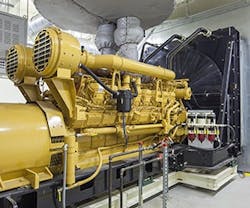Emergency Generator Tips: Business Protection From Power Outages
Is your building prepared to handle an emergency?
If not, now is the time to take the important steps necessary to prepare your facility for future disasters, including expected and unforeseen emergencies.
In order to help people prepare, this week has been designated National Severe Weather Preparedness Week by the Federal Emergency Management Agency and the National Oceanic Atmospheric Administration.
Allen Schaeffer, the executive director of the Diesel Technology Forum, said diesel-powered emergency generators provide the most reliable form of emergency backup power. Many international building codes and standards effectively require diesel generators for code compliance.
To help businesses, communities, and individuals protect critical facilities during a power outage, the Diesel Technology Forum has outlined several ways to ensure backup power in a crisis:
- Assess the risk: Identifying your facility's critical loads is an important first step. Assign a cost to the risks associated with utility power interruptions, production losses, and downtime. Make considerations if natural gas pipeline service is disrupted in your community.
- Install a standby generator: Frequent outages of a few seconds, a few minutes, or more can often disrupt production lines and have significant cost implications to businesses. While other generator drivers take up to two minutes to engage, diesel-powered generators are uniquely qualified to provide power quickly during a power outage and offer the most cost-effective source of reliable backup power available.
- Have sufficient fuel storage: Make sure that you have sufficient fuel storage capacity on-site for an extended outage of several days.
- Maintain your equipment: As required by electrical and safety codes, standby generators should be "exercised" periodically to ensure they will operate as designed in the event of an emergency.
- Contract rental power: If installing your own standby generation is not feasible for your business, you might consider contracting with a firm to reserve rental generator power for use in the event of an extended outage.
- Recheck your system and set up: One of the great lessons of Superstorm Sandy was that even the best generators won't work underwater when subjected to extreme flooding. Is your unit properly located? Is your fuel source also located in a protected area? Also, check the connections and assure you have the proper gauge extension cord for the electrical load and distance.
- Never operate a generator in an enclosed area! Generators need to be used safely in an outdoor setting. Carbon monoxide fumes from generators can build up in enclosed areas and poison people. Never use generators or other gasoline or charcoal-burning devices such as grills or heaters in a garage, an enclosed area, or outside near an open window.
- Check your load: Have you added any new demands or critical circuits to protect? If you’ve added new computers or other power-hungry devices, consider updating switchgear.
- Renew your commitment to maintenance: Make sure you are current on all oil and filter changes, service contracts, etc. You want your generator to start when you need it.
- Follow the rules: If you’re a business operating a stationary unit, make sure you have the proper permits and records on operations.
For more information, visit the National Oceanic and Atmospheric Administration’s website.
